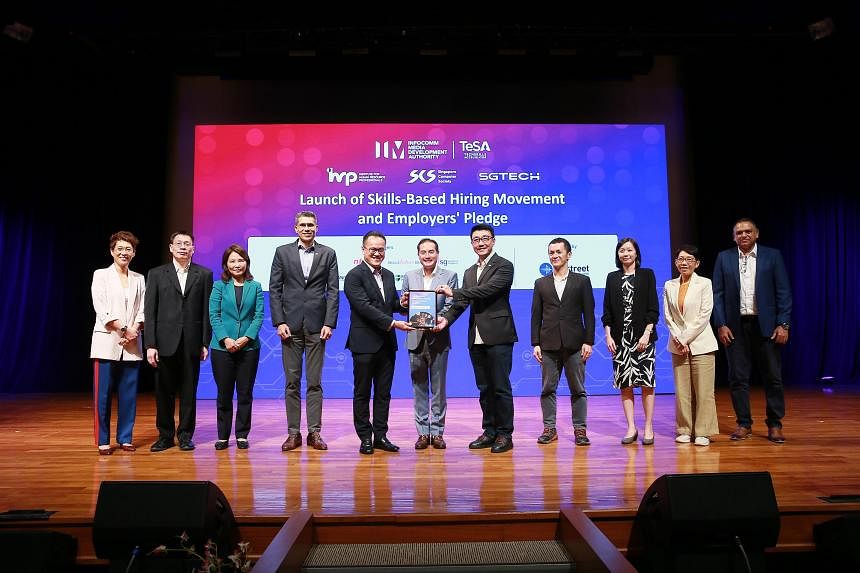SINGAPORE - A virtual handbook launched on Nov 24 can help employers who are keen to take on more skilled staff in tech roles.
The handbook provides practical guidance and best practices for firms to attract, assess and develop tech talent based on competencies rather than academic qualifications or job history – an approach that can open up more opportunities for polytechnic and Institute of Technical Education (ITE) graduates.
Senior Minister of State for Communications and Information Tan Kiat How, who announced the initiative, said around 100 companies, including PayPal, HSBC, Cisco and Singapore-based start-up Accredify, have pledged to hire tech workers using a skills-based approach.
They will also offer opportunities for people to gain practical experience and develop capabilities, such as internships with ITE and the polytechnics, apprenticeships and work-study programmes.
A skills-based hiring approach benefits companies, workers and the economy, said Mr Tan, who is also Senior Minister of State for National Development.
“Companies can tap a wider pool of talent and find a candidate with the necessary skills for the job. Job seekers will be assessed based on their tech skills and potential, regardless of their background or previous work experience,” he told students and employers at the TechConnect Campus Roadshow at Temasek Polytechnic.
He cited the example of Accenture, which adopted a rigorous multi-stage assessment focusing on skills, competencies and growth potential. This reduced the time to hire – which measures the amount of time between a candidate applying for a job and accepting a job offer – by 75 per cent and increased its quality talent pipeline.
Academic qualifications do not always reflect a job seeker’s current abilities as the tech skills needed at work are changing rapidly. There are now new and diverse ways to acquire tech skill sets, from open-source programmes to community-led initiatives, Mr Tan said.
The World Economic Forum has noted that a skills-based hiring approach could give more than 100 million people across 18 economies access to better job opportunities.
Mr Tan added that the approach is in line with shifts outlined recently in the Forward Singapore report, which includes embracing learning beyond grades to create diverse pathways of success, and creating good and fulfilling jobs.
Skills-based hiring practices include identifying and defining core skills and competencies for roles and aligning them with a company’s objectives and future needs. During the selection process, employers should use skills-based assessments to evaluate candidates.
Beyond that, employers should also provide training and development opportunities to help employees acquire new skills and grow in their roles.
Companies interested in taking the pledge to support skills-based hiring can visit the Infocomm Media Development Authority’s (IMDA) website at go.gov.sg/tip-alliance and fill out the pledge form. IMDA will contact companies who have submitted the form to provide more information and support.
The new Skills-Based Hiring Handbook, available on the Institute for Human Resource Professionals’ (IHRP) website, was developed by IHRP and the TechSkills Accelerator for ITE and Polytechnics Alliance, and supported by IMDA.
IMDA deputy chief executive Kiren Kumar said: “As Singapore’s economy digitalises at scale, we see an increasing demand for tech professionals, accounting for 5.2 per cent of total employment today. To meet this demand, it is critical for a mindset shift towards skills-based hiring to access a wider pool of talent, including ITE and polytechnic graduates.”
Mr Tan also noted that the number of tech professionals here has increased from around 155,500 in 2017 to 201,100 in 2022, driven by demand across all sectors.
The Government has made concerted efforts to build a stable pipeline of tech talent, such as by increasing the local intake of information and digital technologies courses across universities, polytechnics and ITE, he said.
The share of tertiary students in such courses has grown from 11 per cent to 16 per cent over the past five years, and the local intake of university students in such courses has more than doubled, from 1,600 in 2017, to 3,600 in 2022, he said.


